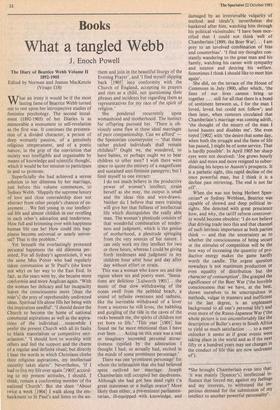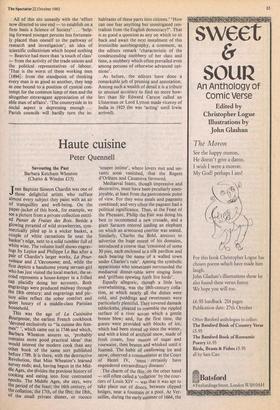Books
What a tangled Webb
J. Enoch Powell
The Diary of Beatrice Webb Volume II 1892-1905 Edited by Norman and Jeanne MacKenzie (Virago 18) what an irony it would be if the most lasting fame of Beatrice Webb turned out to rest upon her introspective studies of feminine psychology. The second instal- ment (1892-1905) of her Diaries is as memorable a monument to self-revelation as the first was. It continues the presenta- tion of a divided character, a person of deep womanly passion, of a genuinely religious temperament, and of a poetic nature, in the grip of the conviction that society was intelligible and organisable by means of knowledge and scientific thought, which it would be her mission to participate in and to promote.
Superficially she had achieved a serene solution to her dilemma by her marriage, just before this volume commences, to Sydney Webb. 'Happily the supreme luxury of love and close comradeship does not abstract from other people's chances of en- joyment ... We feel young in our intellect- ual life and almost childish in our revelling in each other's adoration and tenderness. How full and brimming over with happiness human life can be! How could this hap- piness become universal or nearly univer- sal? That is the problem.'
Yet beneath the everlastingly protested personal happiness the old dilemma per- sisted. For all Sydney's agnosticism, it was the same Miss Potter who had regularly taken communion at St Paul's (she knew not why) on her way to the East End. In fact, as the years went by, she became more conformist and more Anglican again. 'With the woman her delicacy and her incapacity leaves the consciousness more [than the man's] the prey of reprehensibly undirected ideas. Spiritual life alone fills her being with the inspiration needful'. 'I should desire the Church to become the home of national communal aspirations as well as the aspira- tions of the individual... meanwhile I prefer the present Church with all its faults to blank materialism or competitive sect- arianism."I should love to worship with others and feel the support and the charm of a regular and definite ritual; but directly I hear the words in which Christians clothe their religious aspirations, my intellectual sincerity takes alarm'. Nevertheless, 'if I had to live my life over again [1903] accord- ing to my present attitudes, I should, I think, remain a conforming member of the national Church'. But she does: 'About twice a week [1904] I walk along the em- bankment to St Paul's and listen to the an-
them and join in the beautiful liturgy of the Evening Prayer', and 'I find myself slipping back [1905] into conformity with the Church of England, accepting its prayers and rites as a child, not questioning their phrases and incidents but regarding them as representatives for my race of the spirit of religion.'
She pondered recurrently upon womanhood and motherhood. The instinct for offspring pursued her. 'There is ob- viously some flaw in these ideal marriages of pure companionship. Can we afford' — the Spencerian counterpoint — 'that these rather picked individuals shall remain childless?' Ought we, she wondered, to have babies, or perhaps ought we to bear children to other men? I wish there were space to quote the entirety of a magnificent and sustained anti-feminist panegyric; but I limit myself to one extract: I do not much believe in the productive power of woman's intellect; strain herself as she may, the output is small and the ideas thin and wire-drawn. Neither do I believe that mere training will give her that fullness of intellectual life which distinguishes the really able man. The woman's plenitude consists of that wonderful combination of tender- ness and judgment, which is the genius of motherhood, a plenitude springing from the very sources of her nature. I can only work my tiny intellect for two or three hours, whereas I could be giving forth tenderness and judgment to my children hour after hour and day after day without effort or strain.
This was a woman who knew sex and the region where sex and poetry meet. 'Sensa- tions are delicious [Lulworth 1901] ...the music of that slow withdrawing of the ocean swell from the pebbled beach, a sound of infinite sweetness and sadness, like the inevitable withdrawal of a lover from a mistress he still loves, the babbling and gurgling of the tide in the caves of the rocks beneath me, the spirits of children not yet born to life.' This year [1901] has found me far more emotional than I have ever been ... Acting on this state was a real or imaginary increased personal attrac- tiveness typified by the admiration I thought I had, or actually had, excited in the minds of some prominent personage.'
There was one 'prominent personage' for whom the infatuation that she had believed spent outlived her marriage. Joseph Chamberlain still occupied her daydreams. Although she had got him dead right Ca great statesman or a malign orator? More likely than either, a pre-eminent parliamen- tarian, ill-equipped with knowledge, and damaged by an irretrievable vulgarity of method and ideals'); nevertheless she hankered after him, watching him through his political vicissitudes: 'I have been mor- tified that I could not think well of Chamberlain [1899, the Boer War] . . . I am prey to an involved combination of bias and counterbias'. 'I find my thoughts con- stantly wandering to the great man and his family, watching his career with sympathy and interest and desiring his welfare. Sometimes I think I should like to meet him again'.
She did, on the terrace of the House of Commons in July 1900, after which, 'the lines of our lives cannot bring us together ... still for all that there is a bond of sentiment between us, I for the man I loved, loved but could not follow'; and then later, when rumours circulated that Chamberlain's marriage was coming adrift, 'the thought of the misery of the man 1 loved haunts and disables me'. She even toyed [1902] with 'the desire that some day, when both the struggle and the fame of life has passed, I might be of some service. That is hardly possible'. In April 1905 her sharp eyes were not deceived: 'Joe grows hourly older and more and more resigned to subor- dinating his hopes to Austen's prospects. It is a pathetic sight, this rapid decline of the once powerful man, but I think it is a decline past retrieving. The end is not far off'.
When she was not being Herbert Spen- cerian* or Sydney Webbian, Beatrice was capable of shrewd and deep political in- sights. She detected with great prescience how, and why, the tariff reform controver- sy would become obsolete: 'I do not believe that driving trade into this and that channel of such intrinsic importance as both parties think — and that the uncertainty as to whether the consciousness of being secure or the stimulus of competition will be the best way of increasing the quantity of pro- ductive energy makes the game hardly worth the candle. The urgent question nowadays is not maximum production or even equality of distribution but the character of consumption'. She grasped the significance of the Boer War (`the horrible consciousness that we have, at the best, shown ourselves to be unscrupulous in methods, vulgar in manners and inefficient to the last degree, is an unpleasant background to all one's personal life') and even more of the Russo-Japanese War ('the whole picture is too uncomfortably like the description of Buller's army in South Africa to yield us much satisfaction ... to a mere onlooker it seems as if great events were taking place in the world and as if the next fifty or a hundred years may see changes in the conduct of life that are now undreamt or).
She brought Chamberlain even into that: 'it was mainly [Spencer's] intellectual in- fluence that forced me, against my feelings and my interests, to withstand the im- perious demand for the submission of my intellect to another powerful personality'. All of this sits uneasily with the 'effort now directed to one end — to establish on a
firm basis a Science of Society' . 'help- ing forward younger persons less fortunate- ly placed than oneself to the pathway of research and investigation', an idea of scientific collectivism which hoped nothing — Beatrice had more than 'a touch of class' — from the activity of the trade unions and the political representatives of labour. 'That is the worst of these working men [1894]: from the standpoint of thinking every man is as good as another, they leap at one bound to a position of cynical con- tempt for the common lump of men and the altogether extravagant appreciation of the able man of affairs'. 'The countryside in its social aspect is depressing enough .. . Parish councils will hardly turn the in-
habitants of these parts into citizens.' How can one fear anything but unmitigated cen- tralism from the English democracy?'. That is as good a question as any on which to sit back and await the next instalment of this irresistible autobiography, a comment, as the editors remark 'characteristic of the condescending snobbery of her class and time, a snobbery which often prevailed even among persons of otherwise advanced opi- nions'.
As before, the editors have done a remarkable job of pruning and annotation. Among such a wealth of detail it is a tribute to unusual accuracy to find no more how- lers than Sir Edward Carson called an Ulsterman or Lord Lytton made viceroy of India in 1925 (he was 'acting' until Irwin arrived).















































 Previous page
Previous page